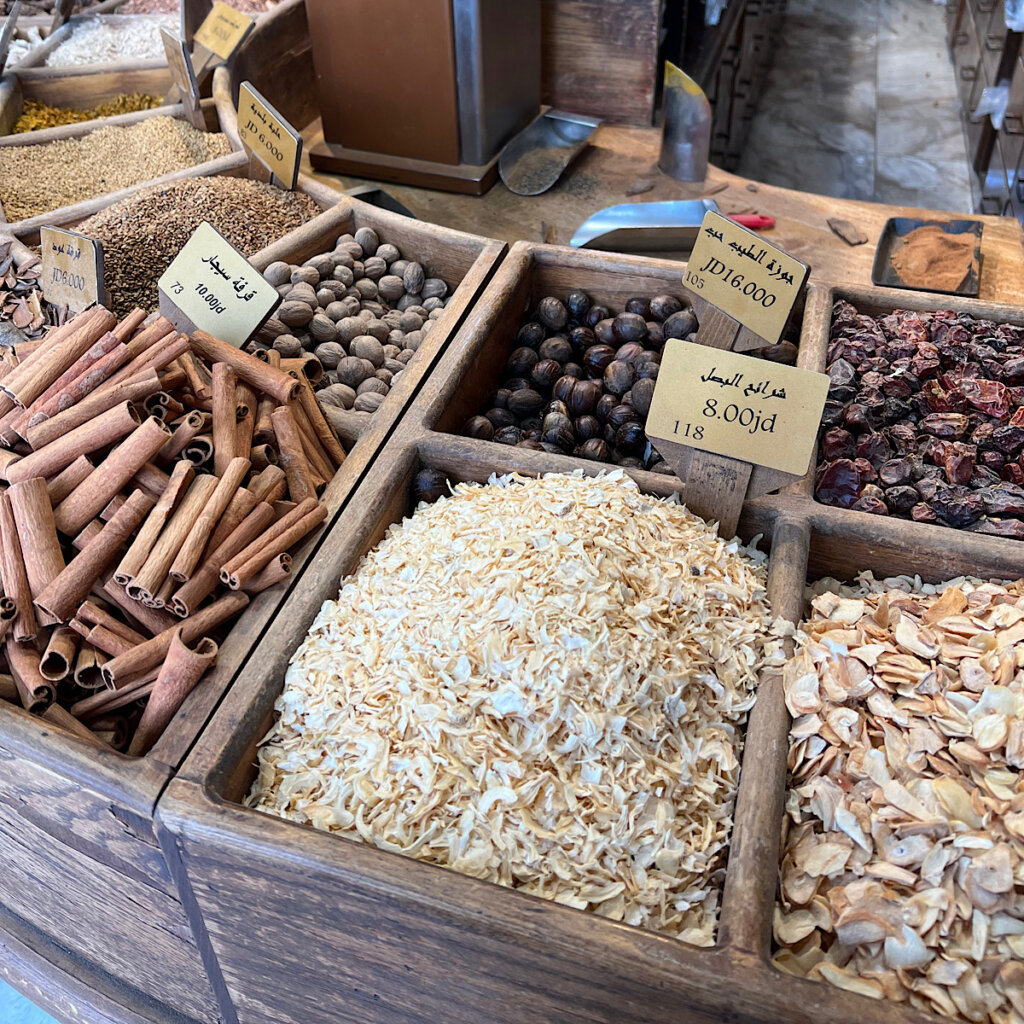
Your complete guide to cooking delicious Arabic food at home! If you love Arabic food, and want to learn how to cook it at home, you've come to the right place.
We just got back from our month long trip to Jordan and Dubai and I couldn't be happier to get back home with all my familiar things around me.
Traveling for a month was so incredible and I learned so much about the culture and the food. I'm really excited to share with you some of the things I learned on my trip about Arabic cooking and spices! Most of all, I can't wait to go back again and Jordan has become my favorite country.
WHAT'S CONSIDERED ARABIC COOKING, OR MIDDLE EASTERN COOKING?
Arabic cooking is food that comes from the 22 countries in the Middle East and North Africa. Algeria, Bahrain, the Comoros Islands, Djibouti, Egypt, Iraq, Jordan, Kuwait, Lebanon, Libya, Morocco, Mauritania, Oman, Palestine, Qatar, Saudi Arabia, Somalia, Sudan, Syria, Tunisia, the United Arab Emirates, and Yemen.
The Arabic recipes you'll find here on my blog are mainly from the Levantine region, specifically Jordan and Palestine. This is because that is where my husbands family hails from, and those are the loved ones that I have the honor of learning from.
5 countries make up the Levantine region of the Middle East:
- Palestine
- Jordan
- Lebanon
- Syria
- Iraq
LET'S GET STARTED, TOOLS AND KITCHEN EQUIPMENT YOU'LL NEED
Believe it or not, you don't need anything very fancy in your kitchen for making delicious and Authentic Arabic food at home.
Here are the 5 most important things I personally use in my cooking:
- Large pot with a tight fitting lid. Most Arabic recipes are made for big families, so they are made in these really big pots! Invest in a high quality pot and you really can't go wrong.
- Large serving platter. Most Arabic households are very large, so they serve meals on a big metal serving platter in the center of the table so there's enough for everyone to share! You can pick one of these up at your local Arabic/ Middle Eastern market. They are very inexpensive.
- Large wok or skillet. I love using my wok for making Galayet Bandora because it holds everything in one big pan. If you're planning on making famous shrak bread at home, you can cook it on a wok turned upside down! So the wok has multiple purposes.
- Immersion blender. In the colder months, many families love to make Shorbat Adas to stay warm. Instead of trying to transfer hot soup to a blender, an immersion blender is much easier to use to blend your soup right in the pot.
- Cast iron skillet. This one is not totally necessary if you are buying store bough bread. But, if you plan on making homemade Arabic flat breads at home, I think cast iron skillets make the best homemade bread.
WHAT COOKING METHODS ARE USED IN THE MIDDLE EAST?
The most common cooking methods in the Middle East are stewing and slow cooking. Slow cooking is a hallmark of Arabic cuisine because it allows the flavors to develop and the ingredients to meld together perfectly.
Other techniques used are braising, simmering, and frying to create flavorful Middle Eastern dishes.
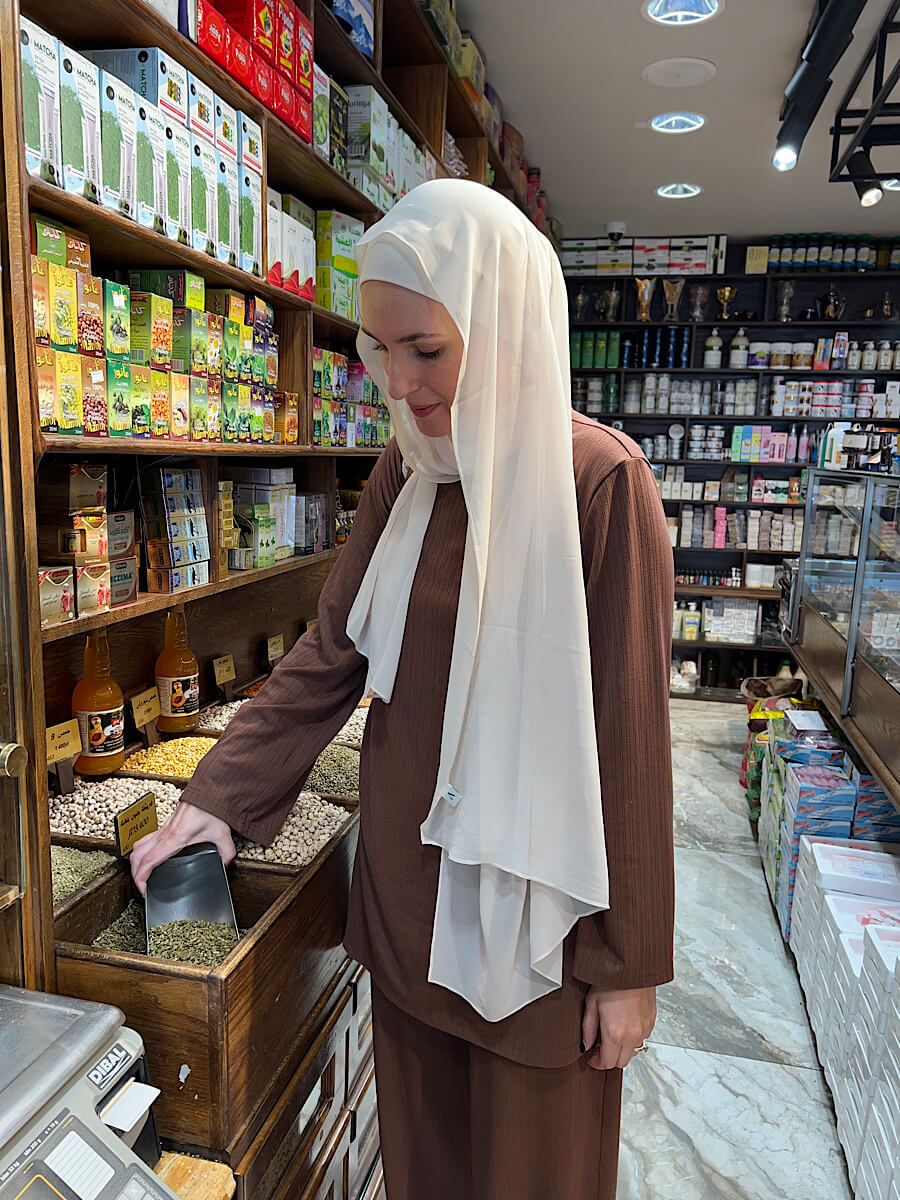
COMMON SPICES IN ARABIC FOOD
Spices are the most important and signature part of cooking Arabic food at home.
- Cardamom is one of the most famous Arabic spices of all time! Make sure you have whole cardamom pods, and also ground cardamom.
- Paprika. Paprika is used in almost every meal too! Grab smoked paprika for a super flavorful dish.
- Bay leaves are used often. I notice bay leaves from the big supermarket have almost no smell or flavor so try to get them as fresh as possible! We got ours in a little shop in Amman and brought them home.
- Coriander is a must have in your spice cupboard. Personally I have only ever used the ground coriander in my meals.
- Cinnamon is another very widely used spice. Some dishes call for a while cinnamon stick, while others, like yellow rice, use ground cinnamon. Make sure you have both!
- Cloves. I use a mix of whole cloves and ground cloves in my cooking so have both on hand!
- Dried limes give a delicious tangy and ever so slightly smoky flavor. You'll use these in a couple dishes like Kabsa and Ouzi Rice and are definitely a must have if you want the most authentic flavor.
- Sumac is a delicious tangy spice that gives a tart lemony flavor. It is used sprinkled on salads, and in the famous Palestinian Musakhan.
- Saffron is used in some rice dishes, but to be honest I don't use it very often.
- Za'atar is a famous Arabic spice blend of dried za'atar leaves, sumac, sesame seeds, and sometimes other herbs. I personally don't cook with it much, but in Jordan my in-laws serve it over olive oil and labneh at breakfast almost every morning.
- Some other spices I use but not super frequently are curry powder, cumin, and turmeric.
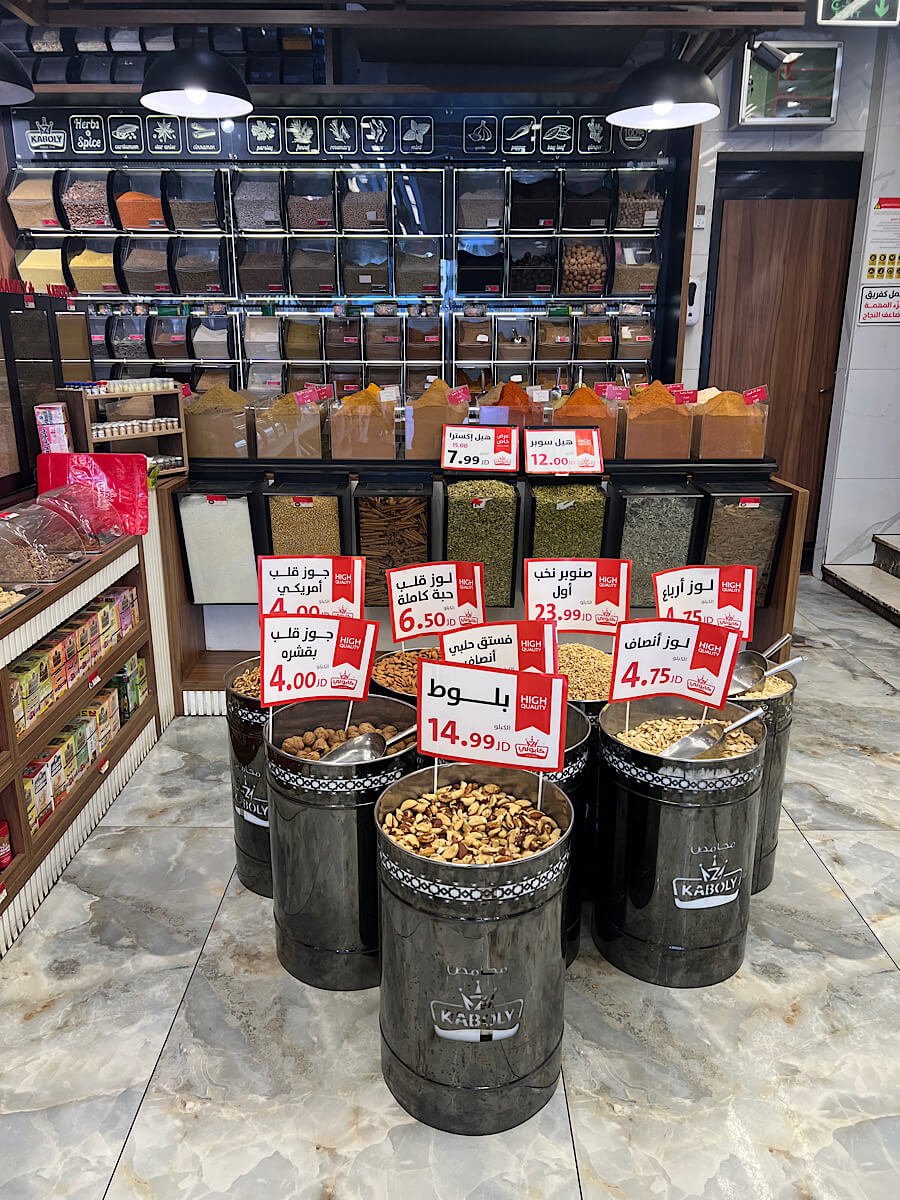
THE SIGNATURE FLAVOR OF ARABIC CUISINE: 7 SPICES
When cooking Arabic food at home, you'll need Arabic 7 spices, or Baharat. 7 spices are a staple in Middle Eastern cooking. 7 spices vary from region to region, from cook to cook. My mother in law makes her own 7 spices differently than my husbands aunt. And they make it differently than their close relative who even live next door!
7 spices is an all-purpose Arabic spice that gives Arabic meals the signature warm, earthy, and slightly smoky flavor. The blend varies, but it typically is a mixture of these:
- black pepper
- coriander
- paprika
- cardamom
- nutmeg
- cumin
- cloves
- cinnamon
HOW TO MAKE HOMEMADE ARABIC 7 SPICES WITH WHOLE SPICES
Arabic 7 spices is so easy to make at home and will give you the most flavor in your Arabic meals! Keep in mind, this is a very general list of what goes into homemade Arabic 7 spices. Over time, you can taste the spices in your cooking and adjust it to your preferences.
For example, if you like your food to be a bit more sweet, add more cinnamon and nutmeg. If you like more of an earthy flavor, add more cumin. And if you like it to be more spicy add more black pepper.
Over time, you'll create your very own signature 7 spices your family and guests can look forward to eating!
- 2 tbsp Allspice Berries
- 2 tbsp Cumin Seeds
- 2 tbsp Coriander Seeds
- 2 tbsp Black Peppercorns
- 1 Whole Cinnamon Stick
- 2 tbsp Whole Cloves
- 2 tbsp Whole Nutmeg
INSTRUCTIONS:
- Start by toasting your whole spices. This helps to bring out the flavor of the ingredients and contribute to the slightly smoky flavor of authentic Arabic food. In a cast iron skillet, add all of your whole spices except for the nutmeg.
- Grind your whole spices in a mortar and pestle first, and then transfer to a blender or food processor to pulse the spices to a fine powder. If you don't have a blender, you can filter the spices through a fine mesh strainer to filter out the larger pieces of spices.
- Store your homemade 7 spice blend in an airtight container in the fridge or freezer for 6-12 months. I store half in the fridge, and half in the freezer to really preserve the flavor the longest.
INGREDIENTS THAT SHOULD ALWAYS BE ON YOUR SHOPPING LIST FOR ARABIC COOKING AT HOME
If you make a lot of Arabic food at home, or are planning to start making more of it then these ingredients should always be on your shopping list:
- Real high quality olive oil
- Labneh & plain yogurt
- Parsley (flat leaf not curly)
- Lemons
- Tomatoes
- Cucumbers
- Red onions or yellow onions
- Basmati rice
- Egyptian rice
- Pine nuts
- Slivered almonds
- Chickpeas
- Red lentils
- Tahini
- Pomegranate molasses
- Bone in halal chickens
- Quality halal lamb
- Quality halal beef and ground beef
Other people I know like to cook with freekeh, bulgur, and dried berries but to be honest these ingredients are still sitting in my cupboard.
If you love Arabic sweets, make sure you also have pistachios, walnuts, honey, rose water, and orange blossom water.
MY TOP 5 TIPS FOR COOKING DELICIOUS ARABIC FOOD AT HOME
- Time! Most good Arabic recipes are going to take a lot longer than other cuisines. Be patient and ready for the learning curve. In the end it will be well worth the time and effort.
- Quality spice. Arabic food is super flavorful, so make sure you are investing in high quality spices. Buy small amounts of good spice rather than the big value jug that is never as flavorful.
- Learn to clean your chicken! This may sound odd if you haven't heard it before, but once you smell the chicken smell.. you can't un-smell it.
- Learn to cook lamb properly! If your lamb is cooked too short it will be tough and chewy. But, too long and it will try out. The best way to cook lamb in my experience is either in a pressure cooker for about 30 minutes with spices. Or, in a Dutch oven lined with parchment paper and a tight fitting lid for 2 hours at low heat.
- Find a local to learn from! While there is a lot of Arabic cookbooks out there, I haven't found one that has taught me what my mother in law, my aunt and sister in law have taught me. The best Arabic recipes are traded through hands on learning.
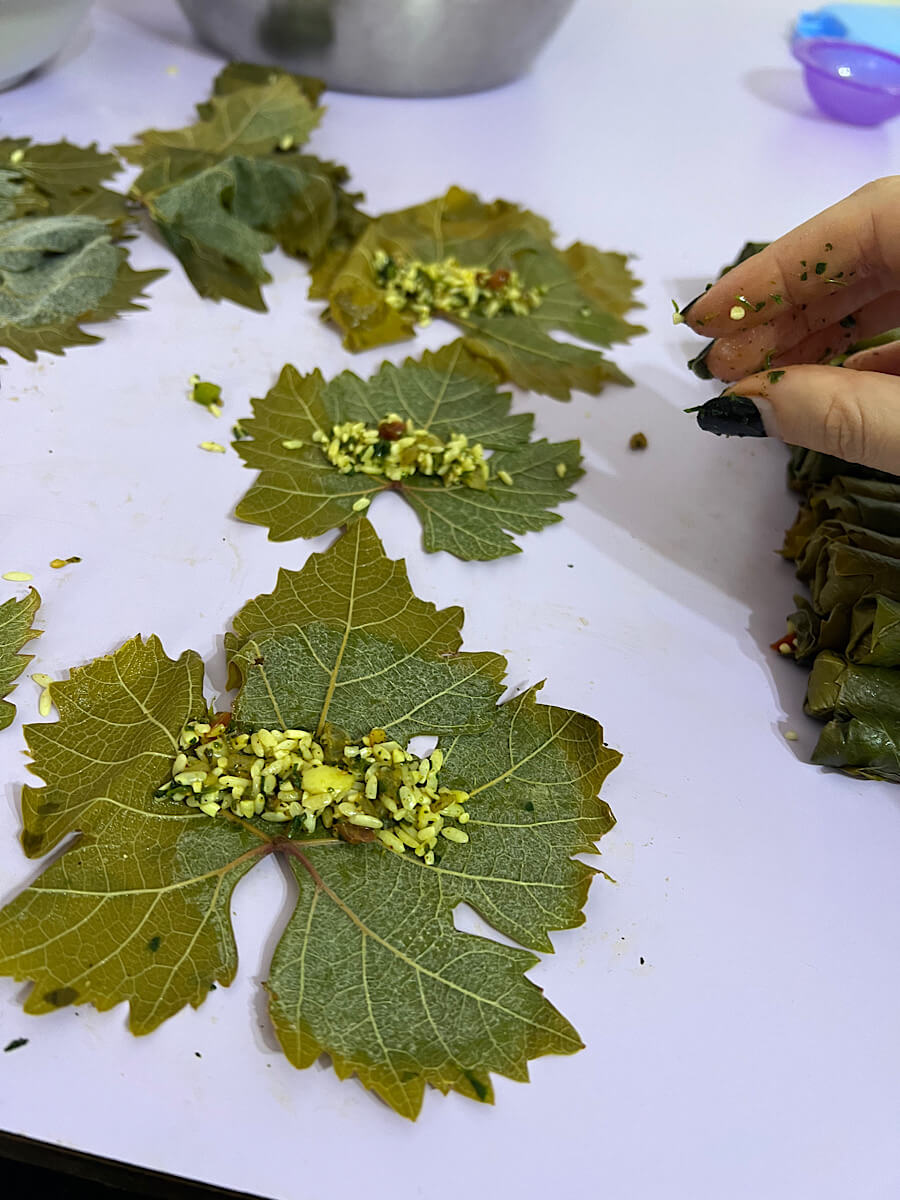
8 OF THE MOST FAMOUS ARABIC RECIPES YOU CAN MAKE AT HOME TODAY!
If you want to make authentic and delicious Arabic food, here are my 8 most popular and loved Arabic recipes. In each recipe I really break the instructions down for you to make the recipe easy to follow and understand.
- Palestinian Maqluba
- Chicken Kabsa
- Stuffed Grape Leaves
- Ouzi Lamb
- Palestinian Musakhan
- Shorbat Adas
- Arabic Chopped Salad
- Basbousa with Cream
No Arabic meal is complete without Arabic tea, make sure to try out my Authentic Jordanian Bedouin Tea Recipe!
FAQ'S
Frequently asked questions about cooking Arabic food at home.
What are the basic Arabic food?
Basic Arabic food includes rice and meat. Main dishes are usually served around midday rather than evening time and accompanied with seasonal salads, fresh yogurt and fresh flat bread.
What are the ingredients in Arabic food?
Common ingredients in Arabic food include olive oil and olives, pita and flat bread; fresh spices; dates; chickpeas; mint; rice and parsley. Popular dishes include grape leaves, kebabs, shawarma, baklava, yogurt and hummus dips.
What is a traditional Arabic dish?
The most traditional Arabic dishes usually have some kind of meat paired with rice. Served either as an appetizer or next to the main meal you'll find hummus, yogurt, olive oils, fresh spices, and fresh homemade bread.
What is a typical Arabic dinner?
At a typical Arabic dinner you'll almost always be greeted with fresh hummus spread, bread, labne and other finger foods. The main meal will be served in the middle of the table or seating area on a very large platter, shared commonly.
Dinners, especially for special guests, are lamb or chicken over some kind of spiced rich with various in season vegetables. The hallmark of Arabic meals is honoring guests so if you are visiting an Arabic household be prepared to leave very full!
If you try any of my Arabic Recipes, please let me know your thoughts by leaving a rating and comment below! Ready for more? Subscribe to my newsletter or follow along on Pinterest, Instagram, Facebook, and Youtube!
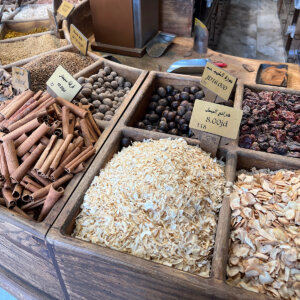
How to Cook Authentic Arabic Food at Home!
Equipment
- Blender or food processor
Ingredients
- 2 tablespoon Allspice Berries
- 2 tablespoon Cumin Seeds
- 2 tablespoon Coriander Seeds
- 2 tablespoon Black Peppercorns
- 1 Whole Cinnamon Stick
- 2 tablespoon Whole Cloves
- 2 tablespoon Whole Nutmeg
Instructions
- Start by toasting your spices. This helps to bring out the flavor of the ingredients and contribute to the slightly smoky flavor of authentic Arabic food. In a cast iron skillet, add all of your whole spices except for the nutmeg.
- Grind your whole spices in a mortar and pestle first, and then transfer to a blender or food processor to pulse the spices to a fine powder. If you don't have a blender, you can filter the spices through a fine mesh strainer to filter out the larger pieces of spices.
- Store your homemade 7 spice blend in an airtight container in the fridge or freezer for 6-12 months. I store half in the fridge, and half in the freezer to really preserve the flavor the longest.


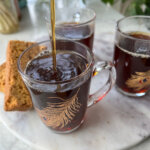
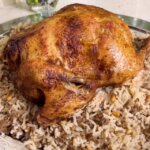
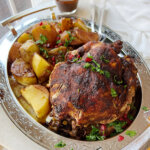
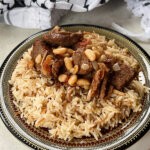
C
These roasted chickpeas were sooo good! I added them on top of the hummus and they made a perfect little crunch
Anne
This is such an excellent post for how to get started! We went to Jordan a couple years ago and I’ve been wanting to learn how to cook up Arabic food ever since we got back
Joanna
I found your site while trying to find a good tikka masala recipe and was pleasantly surprised to see that you cook Middle Eastern food! I’m half Palestinian, but, unfortunately, have never learned how to cook Middle Eastern. My stumble across your site has given me the motivation to attempt to learn! Thank you!
Rosemary
Awwwwe this makes me so so happy to read!! I can't wait to hear what Middle Eastern recipes you try first!!